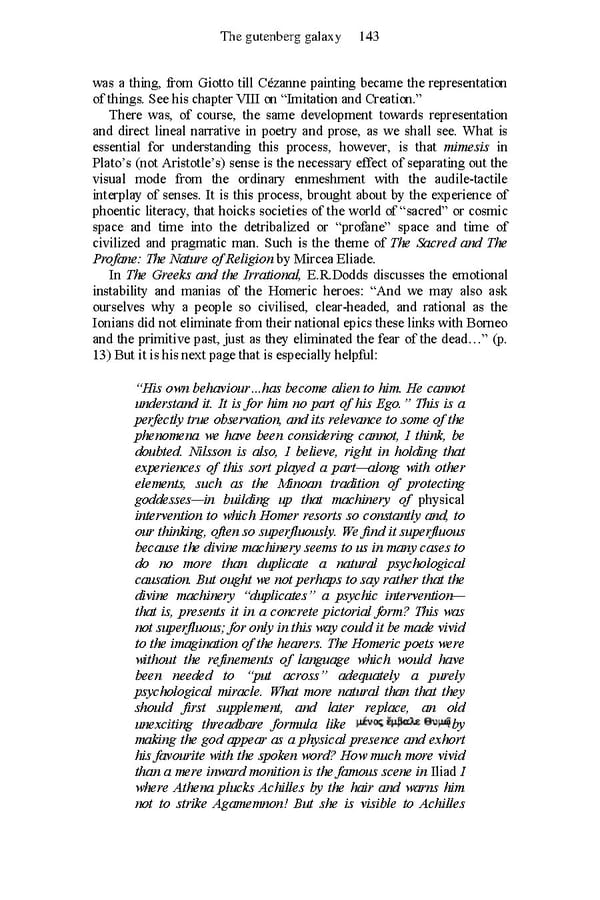The gutenberg galaxy 143 was a thing, from Giotto till Cézanne painting became the representation of things. See his chapter VIII on “Imitation and Creation.” There was, of course, the same development towards representation and direct lineal narrative in poetry and prose, as we shall see. What is essential for understanding this process, however, is that mimesis in Plato’s (not Aristotle’s) sense is the necessary effect of separating out the visual mode from the ordinary enmeshment with the audile-tactile interplay of senses. It is this process, brought about by the experience of phoentic literacy, that hoicks societies of the world of “sacred” or cosmic space and time into the detribalized or “profane” space and time of civilized and pragmatic man. Such is the theme of The Sacred and The Profane: The Nature of Religion by Mircea Eliade. In The Greeks and the Irrational, E.R.Dodds discusses the emotional instability and manias of the Homeric heroes: “And we may also ask ourselves why a people so civilised, clear-headed, and rational as the Ionians did not eliminate from their national epics these links with Borneo and the primitive past, just as they eliminated the fear of the dead…” (p. 13) But it is his next page that is especially helpful: “His own behaviour…has become alien to him. He cannot understand it. It is for him no part of his Ego.” This is a perfectly true observation, and its relevance to some of the phenomena we have been considering cannot, I think, be doubted. Nilsson is also, I believe, right in holding that experiences of this sort played a part—along with other elements, such as the Minoan tradition of protecting goddesses—in building up that machinery of physical intervention to which Homer resorts so constantly and, to our thinking, often so superfluously. We find it superfluous because the divine machinery seems to us in many cases to do no more than duplicate a natural psychological causation. But ought we not perhaps to say rather that the divine machinery “duplicates” a psychic intervention— that is, presents it in a concrete pictorial form? This was not superfluous; for only in this way could it be made vivid to the imagination of the hearers. The Homeric poets were without the refinements of language which would have been needed to “put across” adequately a purely psychological miracle. What more natural than that they should first supplement, and later replace, an old unexciting threadbare formula like by making the god appear as a physical presence and exhort his favourite with the spoken word? How much more vivid than a mere inward monition is the famous scene in Iliad I where Athena plucks Achilles by the hair and warns him not to strike Agamemnon! But she is visible to Achilles
 Essential McLuhan Page 149 Page 151
Essential McLuhan Page 149 Page 151